Curriculum Overview
Knowing Ponds
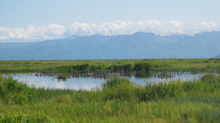 Just like in a tidepool, life in a pond is "living on the edge." Ponds are pockets of water bounded by land. Lots of pond dwellers spend their time entirely in the water, but quite a diversity of life can be found along the boundaries between water and air and water and land. Each living thing—fish, snail, lily pad, frog, water strider, or turtle—is interconnected and has its needs uniquely met within this freshwater habitat.
Just like in a tidepool, life in a pond is "living on the edge." Ponds are pockets of water bounded by land. Lots of pond dwellers spend their time entirely in the water, but quite a diversity of life can be found along the boundaries between water and air and water and land. Each living thing—fish, snail, lily pad, frog, water strider, or turtle—is interconnected and has its needs uniquely met within this freshwater habitat.
Teaching Ponds
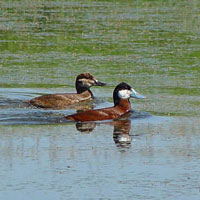
The Next Generation Science Standards (NGSS) ask Kindergarten students to develop an understanding of what plants and animals need to live and grow, how humans may affect the world around them, and how we can engineer solutions to protect habitats so that animals' and plants' needs are still met. To deepen students' understanding of these ideas and their understanding of how science works, NGSS asks students to apply the crosscutting concepts of patterns, cause and effect, and systems and system models as well as the science and engineering practices of analyzing and interpreting data, engaging in argument from evidence, asking questions and defining problems, developing and using models, and obtaining, evaluating and communicating information.
The MARE Kindergarten Ponds curriculum addresses the NGSS as well as Common Core State Standards for ELA and Math by having students explore real ponds, build, maintain, and investigate a desktop model pond in the classroom, research and share information about pond organisms, as well as engineer some solutions to environmental issues that may impact pond organisms occurring in their own schoolyard. Download a curriculum overview, NGSS, Common Core, and ocean literacy correlations here.
Websites
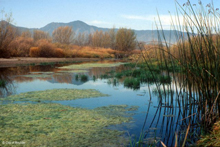 You can now search for Habitat specific web links through our Resource Materials search.
You can now search for Habitat specific web links through our Resource Materials search.
To find general web links about ocean sciences, visit the useful web links page in our News section.
Field Trip Tips
Whether you visit a real or a virtual pond, balance the need to identify what your students see with the need to observe it. Help them get more out of seeing an organism than just its name!
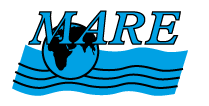
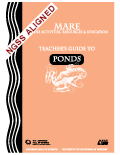 Kindergarten curriculum is focused on Ponds
Kindergarten curriculum is focused on Ponds


